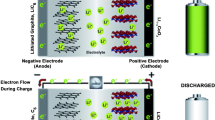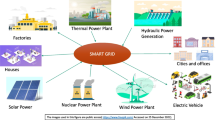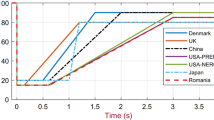Abstract
Energy Storage Systems (ESSs) form an essential component of Microgrids and have a wide range of performance requirements. One of the challenges in designing microgrids is sizing of ESS to meet the load demand. Among various Energy storage systems, sizing of Battery Energy Storage System (BESS) helps not only in shaving the peak demand but also maximizes the benefits related to their use. This paper presents an algorithm to optimize the objectives of electricity and operating cost by allocating the size of BESS for delivering the maximum power, in a selected time interval based on C-rate and correspondingly obtained the energy management for PV-BESS and diesel generator-based microgrid system. Here, C-rate of BESS is considered to select the time interval of discharge from BESS as 0.5 and 1 which indicates 2 h and 1 h of discharge durations with respect to maximum load demand and determined the savings in electricity bill for corresponding discharge durations. Nonlinear Model Predictive Control with FMINCON solver-based technique has been adopted to perform the objectives and compared with heuristic-based methods for increasing durations of BESS size. The prediction horizon is divided into two different time intervals based on charging/discharging durations in 24 h to obtain optimal sizing of BESS. Simulation results obtained by Nonlinear Model Predictive Control with FMINCON prove the effective cost minimization of the electricity bill by proper coordination of charge/discharge times of BESS.











Similar content being viewed by others
References
Jadav, K.A., Karkar, H.M. & Trivedi, I.N. A review of microgrid architectures and control strategy. J. Inst. Eng. IndiaSer. B 98, 591598. (2017) https://doi.org/10.1007/s40031-017-0287-3
M. HasanHemmatpour, Optimum interconnected islanded microgrids operation with high levels of renewable energy. Smart. Sci 7(1), 47–58 (2019)
Furkan Ahamad and Mohammad Saad Alam, Optimal sizing and analysis of solar PV, wind and energy storage hybrid system for campus microgrid. Smart. Sci 6(2), 150–157 (2018)
S. Jha, B. Singh, S. Mishra, Performance enhancement of PV–DG–BS distributed generation system in Islanded Mode. J. Inst. Eng. IndiaSer. B 102, 311–321 (2021). https://doi.org/10.1007/s40031-020-00510-4
Rasou Garambadri, Hui Li and Zilo, “Optimization of battery energy storage capacity for a grid tied renewable microgrid”, IEEE Innovative Smart Grid Technologies, dec. 2017
Chen Shuaixn and Ming Wang, “Sizing of energy storage for microgrids”, IEEE Transactions on Smart Grid, vol.3, no.1, March. 2012
Rajesh kamble, Gauri karve, and Amarnath chakradeo, Optimal sizing of battery energy storage system in microgrid by using PSO technique, J Int. Sci. technol, Jun 2018
Ha Thu Le, Thang and Quang Nguyen, “Sizing energy storage systems for wind power firming”, IEEE power and Energy society general meeting, July 2008
R.Chedid and S.Karan, A multi-objective design methodology for hybrid renewable energy systems, IEEE Russian power tech, May 2008
Kumar, R.H., Ushakumari, S. A Novel control strategy for autonomous Operation of isolated microgrid with prioritized loads. J. Inst. Eng. India Ser. B 99, 323330 (2018) https://doi.org/10.1007/s40031-018-0335-7
Desh Deepak Sharma, “Model predictive control system design for energy management with optimal usage of battery energy storage system”, International Journal of Electrical and Electronic Engineers”, volume 07, issue 01, June.2015
J.P. Fossati, A. Galarza, A. Martin-Villate, L. Fontan, A method for optimal sizing energy storage systems for microgrids. J Renew Energy, Elsevier, June. 77, 539–549 (2015)
A. Abdulkarim, S. M. Abdelkader, D. J.Morrow, S. A. Y. Amuda.I. S. Madugu, A. J. Falade, S.SaminuandY. A. Adediran, Effects of PV and battery storage technologies on optimal sizing of Renewable energy microgrid” J. Elektrika. Volume. 17, No.1, April. 2018
De, M., Das, G. & Mandal, K.K. Proposing intelligent energy management model for implementing price rate in microgrids using demandresponseprogram. J. Inst. Eng. IndiaSer. B 102, 427–435(2021) https://doi.org/10.1007/s40031-021-00564-y
Arash Khatamianfar, Muhammad Khalid, Andrey V. Savkin and Vassilios G. Agelidis, “Improving wind farm dispatch in the Australian electricity market with battery energy storage using Model predictive control”, IEEE Transactions on Sustainable Energy, Vol.4, No.3, July.2013
A. Dolara and G. Marchegiani, “Optimal management algorithm for BESS system included in an Islanded microgrid”, IEEE conference on Electrical Engineering, June.2016
M. Baumann, M. Buchholz and K. Dietmayer, Model predictive control of a hybrid energy storage system using load prediction, 2017 13th IEEE International Conference on Control & Automation (ICCA), 2017, pp.636641, doi:https://doi.org/10.1109/ICCA.2017.8003134
Kumar, S. Cost-based unit commitment in a stand-alone hybrid microgrid with demand responseflexibility. J. Inst. Eng. IndiaSer. B (2021). https://doi.org/10.1007/s40031-021-00634-1
Mehrtash, Mahdi & Capitanescu, Florin (2020) An Efficient mixed-integer linear programming model for optimal sizing of battery energy storage in smart buildings https://doi.org/10.1109/TPEC48276.2020.9042498
K. Hesaroor, D. Das, Optimal sizing of energy storage system in islanded microgrid using incremental cost approach. J. Energy. Storage. 24, 100768 (2019). https://doi.org/10.1016/j.est.2019.100768
B. Mohamadi, J. B. Noshahr, B. Adelmanesh, E. Shidare and M. Kermani, Optimal Battery energy storage sizing in microgrids by using artificial flora algorithm, 2020 IEEE International Conference on Environment and Electrical Engineering and 2020 IEEE Industrial and Commercial Power Systems Europe (EEEIC / I&CPSEurope), 2020, pp.16, doi:https://doi.org/10.1109/EEEIC/ICPSEurope49358.2020.9160506
J. Gao, J.J. Chen, Y. Cai, S.-Q. Zeng, Ke. Peng, A two-stage microgrid cost optimization considering distribution network loss and voltage deviation. Energy Rep. 6, 263–267 (2020). https://doi.org/10.1016/j.egyr.2019.11.072
L. Zhao, H. Jerbi, R. Abbassi, B. Liu, M. Latifi, H. Nakamura, Sizing renewable energy systems with energy storage systems based microgrids for cost minimization using hybrid shuffled frog-leaping and pattern search algorithm. Sustain. Cities Soc. 73, 103124 (2021). https://doi.org/10.1016/j.scs.2021.103124
Murty, V. V. S. N., Kumar, A. Multi-objective energy management in microgrids with hybrid energy sources and battery energy storage systems. Prot. Control. Mod. Power. Syst 5, 2(2020) https://doi.org/10.1186/s41601-019-0147-z
Kamal, M. M., Ashraf, I. Planning and optimization of hybrid microgrid for reliable electrification of rural region. J. Inst. Eng. India Ser. B 103, 173–188 (2022). https://doi.org/10.1007/s40031-021-00631-4
Nsilulu bungu, Naidoo, Ramesh C.Bansal,Minnesh Bipath, Optimization of grid connected hybrid photovoltaic-wind-battery system using model predictive control design, IET Renewable Power Generation, August 2017
H.M. Murshadul, M.A. Hannan, A. Mohamed, Charging and discharging model of lithium-ion battery for charge equalization control using particle swarm optimization algorithm. J Renew Sustainable Energy. 8, 065701 (2016). https://doi.org/10.1063/1.4967972
Bhukya Ramesh, sushashini, gauri kalnoor, BVVN Manikanta and D. Nageswar Rao. Cost optimization by integrating PV system and battery energy storage into microgrid using Particle swarm optimization, International Journal of Pure and Applied Mathematics.vol. 114, No. 8, pp.45–55, 2017
S.M. LiaquatFakhar, S.A.R.A.O.S. Kashif& RasoolSaleemPadmanaban, Performance nalysis of APSO and firefly algorithm for short term optimal scheduling of multi-generation hybrid energy system. IEEE Access (2020). https://doi.org/10.1109/ACCESS.2020.3027436
M. Jayachandran, G. Ravi, Design and optimization of hybrid micro-Grid system. Energy Procedia. 117, 95–103 (2017). https://doi.org/10.1016/j.egypro.2017.05.111
Acknowledgements
Authors would like to thank National Institute of Technology (NITW) for providing necessary research facilities.
Funding
Not Applicable.
Author information
Authors and Affiliations
Corresponding author
Ethics declarations
Conflict of interests
The authors declare that they have no competing interests.
Additional information
Publisher's Note
Springer Nature remains neutral with regard to jurisdictional claims in published maps and institutional affiliations.
Rights and permissions
About this article
Cite this article
Vaka, S.S.K.R., Matam, S.K. Prediction-Based Optimal Sizing of Battery Energy Storage Systems in PV Integrated Microgrids for Electricity Bill Minimization. J. Inst. Eng. India Ser. B 103, 1733–1745 (2022). https://doi.org/10.1007/s40031-022-00778-8
Received:
Accepted:
Published:
Issue Date:
DOI: https://doi.org/10.1007/s40031-022-00778-8




